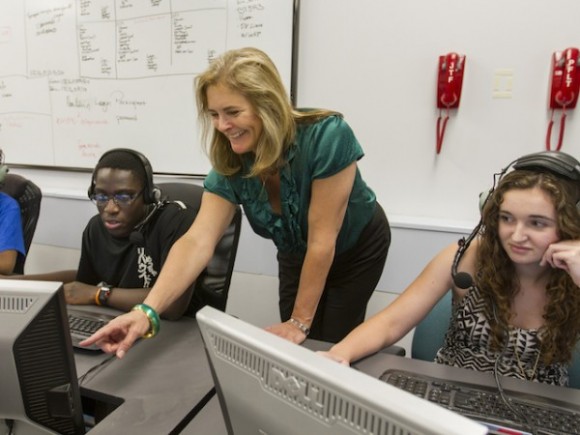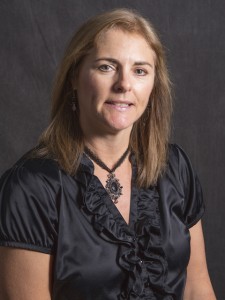
Nancy Cooke’s work helps save lives by marrying psychology, technology

Nancy Cooke, a professor at the Polytechnic School, recently won a lifetime achievement award, the Arnold M. Small President’s Distinguished Award from the Human Factors and Ergonomics Society. The award recognizes her research in ASU’s Human Systems Engineering program, which combines psychology and technology. Photographer: Jessica Hochreiter/ASU.
For her eighth-grade science fair project, Nancy Cooke tested how noise pollution affected human factors.
“I exposed mice to my brother’s drumming, to drills and other sounds,” said Cooke, now an Arizona State University. “They became obese, lost their hearing and ate their young.”
It was the beginning of a fascination with human factors and human systems for Cooke, who recently won a lifetime achievement award, the Arnold M. Small President’s Distinguished Award from the Human Factors and Ergonomics Society.
Cooke is the program chair for Human Systems Engineering in the Polytechnic School, one of ASU’s Ira A. Fulton Schools of Engineering. Started about 15 years ago as applied psychology, the program now has eight faculty members and about 70 majors.
Cooke thinks all engineering majors should take at least one class on human systems engineering to raise their awareness of human factors and how they influence the success of engineering designs.
“Everything engineers make is touched by humans,” she said. “A lot of people think the idea is to build a widget, then give it to the human systems engineering expert to make it more human-friendly. But the designer and human systems engineering expert should be working together from the inception. It’s better to collaborate up front than to have to redesign something like a helicopter after the fact.”
Cooke’s research focuses on individual and team cognition and its application to the development of cognitive and knowledge engineering methodologies, healthcare, homeland security systems, remotely piloted aircraft and emergency response systems.
“It’s not just about how to design machines so people can use them better,” Cooke said. “It’s about considering human capabilities and limitations in designing large socio-technical systems like nuclear power plants. So it’s not just how a pilot functions in a single cockpit, but how humans manage national air space with free flight and unmanned systems.”
Cooke measures the performance of a group by how effective it is at achieving its goals.
“In deciding whether it’s a ‘good team’ or a ‘bad team,’ we’re looking at how the members process interactions,” she said. “We looked at what happens in these teams when you switch out a good team member with a dysfunctional one. Does it make the team dysfunctional?”
Cooke said she is particularly excited about being a member of the Foresight Initiative, an ASU effort to look at how to anticipate and mitigate the national security risks associated with climate change.
The National Geospatial-Intelligence Agency awarded ASU a grant of $20 million for the five-year partnership that will examine how climate change affects resources and contributes to political unrest, as well as to articulate sustainability and resilience strategies.
Cooke is one of only 28 female fellows in the Human Factors and Ergonomics Society, and said her recent lifetime achievement award was given in part because she was the first female editor of Factors: The Journal of the Human Factors and Ergonomics Society, and the first female chair on the National Research Council’s Board on Human-Systems Integration.
She jokes that she likes going to conferences in her field, because there is never a line at the ladies’ room. Her foray into the male-dominated realm was a sort of happenstance.
She grew up in Virginia, near Washington, D.C. Her father, discharged from the Army because of his diabetes, was a Wyeth Pharmaceutical representative, and her mother, who stayed at home when she was younger, later became a lactation consultant.
Cooke started college at George Mason University as a language major. She knew Latin and Spanish, but soon was wondering what kind of job she would get. She liked her classes in psychology and in computer science, where she would hand her research cards to a man behind a desk, and he would run them through a big computer that would spit out results for her a few days later.
She decided to look for other career options and went to the university career center. They directed her to the Dictionary of Occupational Titles, where she discovered human factors, which combined her interests in computer science and the psychology of how technology affects humans.
“It’s a field that’s often not included in the introduction to psychology textbooks,” Cooke said. “If it’s included at all, it’s the last chapter, and they never get to it.”
Cooke switched her major to psychology and tried doing peer counseling, but found it boring. She focused on the idea of how humans work with technology and with each other, and went to New Mexico State University to earn master’s and doctoral degrees in psychology.
One of her early research projects was on how fighter pilots organize and understand maneuvers, how veteran pilots visualize them differently, how military teams think about themselves as a unit, and whether the “right stuff” for doing the job can be inculcated into younger pilots.
Most of her research is focused on military applications and funded by the U.S. Department of Defense.
“I have had a passion for national security as long as I can remember,” Cooke said. “On 9/11, my three daughters, who were 1, 4, and 8 at the time, slept in my bedroom. My mother-bear instincts came out, and I remember looking at them sleeping and becoming really angry. I knew I had to do everything I was capable of doing to keep this from happening again.”
She currently is working on the integration of crews into the ground-control station for the unmanned Predator drone.
“It was created with no evaluation, and now we have a legacy system that trained pilots can’t use,” she said. “It takes 22 key strokes to turn on the autopilot.”
Her husband, a physicist for Sandia Research Corporation, works on earth sensing and tunnel detection, and often helps Cooke with her lab equipment, which includes several simulation rooms for teams of up to six people to practice everything from hostage rescues to drone missions.
The lessons learned couldn’t be more important.
“Psychology saves lives,” said Cooke, who co-authored a book, “Stories of Modern Technology Failures and Cognitive Engineering Successes.”
The book includes the story of Jim Staszewski, a psychology professor at Carnegie Mellon University, who studied the detection of plastic land mines. Most of the soldiers assigned to detection had a success rate of about 20 percent. But one had a detection rate of 80 percent.
Staszewski studied the high achiever and figured out what he did differently, the way he held the metal detector, and the way he moved it over the ground. Other soldiers were trained to perform their tasks similarly, and they were able to achieve the 80-percent detection rate.
“Think of the numbers of explosions he prevented, the number of lives saved,” Cooke said.
Written by Judy Nichols
Media Contact
Sharon Keeler, [email protected]
(480) 965-4012
Ira A. Fulton Schools of Engineering




































